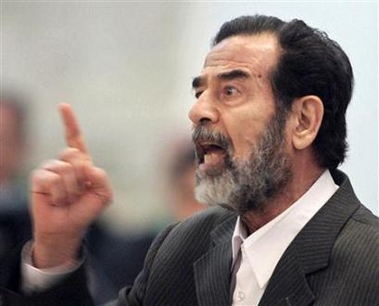|
Saddam shows up for resumption of trial
(AP)
Updated: 2005-12-21 16:58
The trial of Saddam Hussein resumed Wednesday morning after a two-week break,
and the former leader _ who had refused to attend the last session _ was in
court.
Saddam and seven co-defendants are on trial in the deaths of more than 140
Shiite Muslims following a 1982 assassination attempt against him in the town of
Dujail, north of Baghdad.
Saddam refused to attend the last session, held on December 7. One day
before, Saddam in an outburst shouted: "I will not come to an unjust court! Go
to hell!"
Wednesday was Saddam's first court appearance following last week's election,
where Iraqis swarmed to the polls to vote for the country's first full-term
parliament since his downfall.
During previous sessions, Saddam has been defiant and combative at times,
often trying to dominate the courtroom. He and his half brother_ Barazan
Ibrahim, who was head of the Iraqi intelligence during the Dujail incident_ have
used the procedures to protest their own conditions in detention.

Former Iraqi president Saddam Hussein is seen
during his trial in Baghdad, December 6,
2005.[Reuters/file] | The chief prosecutor in the
case, Jaafar al-Mousawi told The Associated Press by telephone on Tuesday that
five prosecution witnesses were ready to take the stand on Wednesday. It would
be up to the court to decided whether to hear all of them, he said. It was
unclear how many more prosecution witnesses, if any, would follow.
"We are very prepared for the resumption of the trial," al-Mousawi said.
"There is evidence and there are documents with Saddam's signature on them,"
he told the AP. "When it's time for the prosecution to make its case, there will
be a surprise."
He did not elaborate or provide any further details.
The court has so far heard nine witnesses, who often gave emotional
testimonies of random arrests, hunger and beatings while in custody and torture
in detention.
Khamis al-Ubeidi, a lawyer on Saddam's defense team, argued that the
"witnesses have no legal value. Their testimonies are based on coaching and
unjustified narrative."
He said the defense team had security concerns that it wanted to tell the
court about.
"The court has to provide the lawyers and the defense witnesses with
security," he told the AP on Tuesday. "How can a lawyer work if he cannot move
freely because of the security situation?"
Some Iraqi government officials have said they hope the trial of Saddam will
help heal the wounds of his government's victims and bring Iraqis closer
together.
But the trial has also highlighted divisions between Iraq's various ethnic
and sectarian groups, with many Sunni Arabs expressing sympathy with the former
president and even nostalgia for his era.
By contrast, many Shiites and Kurds gloated over seeing the once powerful
Saddam reduced to a defendant.
|